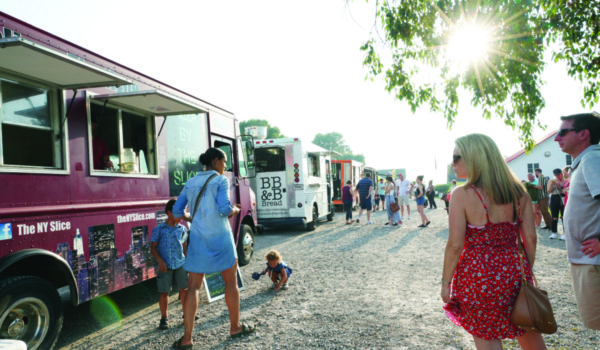
County hosts a variety of food truck operations
Story by Greg Seiter // Photography by Mark Freeland
Up until only a few years ago, food trucks weren’t necessarily held in the highest regard when it came to away-from-home dining options. In fact, at that time, it wasn’t unusual to hear a given mobile vendor referred to as a “roach coach” or “gut truck” and for the quality of food to be compared to what might stereotypically have been found at a gas station convenience store.
With questionable refrigeration systems and challenges associated with accessing clean water, some of that criticism may have been justified, but times have changed. In fact, as food safety regulations continue to evolve, food truck licensing and inspections are more vigorous now than ever before and the public has taken notice.
According to smallbizgenius.net, there are more than 24,000 active food trucks in the U.S. and an estimated 30,000 people working in that business. Average industry growth before COVID-19 was 7.5 percent and the food truck market size in 2020 surpassed $1.2 billion. In addition, despite ongoing pandemic-related challenges, the food truck industry is expected to grow by 2.4 percent in 2021.
Today, many mobile food vendors are almost the equivalent of a standard restaurant venue on wheels, serving everything from breakfast options, coffee and pizza to burgers, ice cream and foreign delicacies. That trend is even noticeable in Johnson County.
Josh Black, who owns Franklin-based Hillbilly Hot Dogs along with his wife, Heidi, considered the possibility of food truck ownership for five or six years before acting on the idea.
“I was born and raised here in town and had never seen anyone do a hot dog truck,” he said. “As I was thinking about it, I’d get some money saved up and then something would happen and I’d have to spend it. I guess it’s probably for the better anyway. I wasn’t ready to do this in my 20s.”
Rather than jumping directly into truck ownership, Black decided to start with a food cart.
“You really have to follow the same guidelines with a cart that you do
with a truck,” he said. “If you’re going
to run it yourself, you have to be certified to handle food, which is about an eight-hour course. Then, there’s insurance.
“Some people borrow tons of money to do this but my idea was to start small and build from there.”
Black, who recently sold his cart and now operates the Hillbilly Hot Dogs trailer full time, said business has steadily improved from one year to the next with 2020 being an obvious exception.
“[In 2020], early in the season, we had a pretty decent book for stops and catering jobs. Things were really booming,” he said. “Then, we started to get cancellations when COVID hit and I knew it wouldn’t be a good year.”
As a result, Black developed an alternative plan.
“It had been on my radar to do some small projects in the trailer so that’s what I did,” he said. “I took the counters out and noticed there was a small window leak. Everything snowballed from there. I changed the floorplan and decided to rip everything apart. It was a bare trailer with windows. I also gave it some curb appeal on the outside.”
Johnson’s BBQ Shack has restaurant locations in both Greenwood and Bargersville but according to Food Truck Operations Manager Ray Lincks, it was a tradition of holiday meal preparation that initially led to the establishment of the Johnson’s BBQ Shack food truck which later resulted in the brick-and-mortar locations.
“I think it all started around 2010 when the Johnson brothers were being complimented for the turkey they smoked for Thanksgiving and other holidays,” Lincks said.
“I’ve known Nate (Johnson) since the third grade so after they invested in a
food truck, he called and said he needed a hand. At that time, I had a full-time
job so I did the truck part time for four or five years.”
Lincks then served as a Johnson’s BBQ Shack restaurant general manager for a while before returning to focus his efforts on food truck operation.
“We now have a trailer and two trucks and while at one point we were excited to do $1,500 in one week, we can now do that in one day,” Lincks said.
Of course, 2020 was a challenging year.
“Business went down and it got really scary, especially during the winter. We really tried to minimize costs and luckily, we were able to take advantage of small business loans,” he said.
With a straight-forward menu that primarily features pulled pork, pulled chicken, beef brisket and side options, Lincks is optimistic.
“Sales have obviously gone up and even though several major events have disappeared, we’re getting a lot of calls from homeowner associations,” he said. “We offer online ordering, too, so people can advance order and we can bring it with us.
“Johnson’s BBQ Shack is continuing to grow and I love being a part of it. This is one of those jobs you don’t mind waking up for every morning.”
Like many entrepreneurs, Ted and Ashely Davidson wear several hats but as co-owners of The Legendary Kitchen food truck, the Davidsons are probably somewhat unique in that they’ve found a way to successfully combine work in two distinctly different businesses — mobile food service and golf.
While Ted serves as golf shop and facility manager at The Legends Golf Club in Franklin, Ashely works as member, event and wedding coordinator there. She also handles all catering for The Legends as well as The Legendary Kitchen.
“A while back, some people recommended we add a restaurant at the club so we looked at adding on to our existing kitchen but it didn’t make sense. So, I suggested a food truck or trailer,” Ashely said.
“When we first bought it, we thought we would just use it on site but have the ability to move around for catering, if needed. But once we took the truck out some, we realized that would be the way to go.”
Even with their collective business experiences to draw from, Ashely admits that she and Ted had a lot to learn about the food truck industry.
“It took us a while to figure out what the expenses just to turn the truck on, go somewhere and cook would be,” she said. “There are extra costs, like propane, that might not normally be associated with a restaurant.”
Interestingly enough, their approach to doing business through a food truck that offers things like tenderloins, chicken tenders, a chicken sandwich and even a tuna sandwich has changed over the years.
“Three years ago, we would go out on the road three to four times per week but now, we may have an event once or twice per week at the course so we may only be able to take the truck out once or twice a week,” Ashely said.
“Things are a lot different for us than with most food truck vendors. We have flexibility.
“Downtown Franklin has done a wonderful job with festivals. In fact, much of our success is because of those festivals. We’re very appreciative and grateful to have been a part of those basically from the very beginning.”


